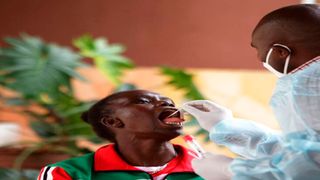
National women volleyball team captain Mercy Moim takes a Covid-19 test on July 6, 2021 at Moi International Sports Centre, Kasarani hostels.
| Chris Omollo | Nation Media GroupNews
Premium
Covid-19: Kenya’s lower testing capacity conceals true extent of infections
What you need to know:
- The decline in testing capacity is happening as the country struggles with new variants that have led to a surge in infections.
- Kenya is also no longer tracing the contacts of patients who test positive for Covid-19.
Kenya had overcome major bottlenecks in mass testing for the coronavirus thanks to innovation and robust daily testing capacity.
But this is now in question after it emerged that the country has run out of testing kits, raising concerns that actual infection numbers could be higher than what is being reported.
The decline in testing capacity is happening as the country struggles with new variants that have led to a surge in infections.
If the government is testing fewer samples per day, is it possible to determine how the virus is spreading in the community or detect the variants from the samples tested?
For instance, for the past two months, the Kenya Medical Research Institute had the capacity to test about 35,000 samples a day but because it does not have enough testing kits it is unable to test even 100 samples.
“For the last two months, I cannot lie to you, we have not been testing. All we are testing are travellers who request testing but we cannot test for the public programme. We do not have the kits,” said a source, who sought anonymity.
Kemri has only about 300 testing kits left and these were given to the research centre by a local lab, the source said.
Only manual kits are available, meaning automated machines are not being used.
No longer tracing contacts
“Even if 1,000 samples are brought, we cannot load because we do not have the kits. The machines are idle. We are waiting for the government to provide us with the kits,” the source said.
Kenya is said to have received kits for automated machines one month ago but they have not been distributed.
“We could be testing vigorously if we had the kits, but we are not testing. Maybe the government is waiting for the manual kits to run out before they distribute the automated kits.”
Statistics show that samples tested per day have been very low, about 5,000. Kenya has tested a cumulative two million samples since its first case of Covid-19 was reported on March 23, 2020.
From testing over 8,000 a day, Kenya now tests an average of 4,000 samples a day and no longer conducts mass testing, without which it is hard to determine how the disease is spreading in communities.
What is more, Kenya is no longer tracing the contacts of patients who test positive for Covid-19. This is considered a critical part of controlling the disease when new cases are surging.
The next strategy is suppressing the virus, to make sure it does not spread further from the original outbreak area.
Presence of the Delta variant
The lacklustre testing is happening in the month that Kemri had projected Kenya would be in its fourth wave of the pandemic.
Infections were expected to be high because of the presence of the Delta variant in Western Kenya, Nyanza, Coast and Nairobi County and its environs.
Kemri’s modelling released yesterday identified the Delta variants to be 60 per cent more transmissible than the Alpha variants.
The Council of Governors has decried the lack of testing kits in counties for the last few months.
“Testing across all counties has slowed down due to lack of kits. This, therefore, means that county governments have no control over the increasing number of Infections,” GoG health committee chairman Anyang’ Nyong’o said.
Prof Nyong’o asked the ministry to provide rapid testing kits (antigens) and PCR Covid-19 testing equipment to all counties in order to stem the spread of the virus.
Vihiga acting Health executive Prof Inonda Mwanje confirmed that the county government had run out of Covid-19 testing kits, further slowing down efforts to reach more residents.
County officials had reached out to the national government to supply it with more kits, even as the county makes plans to procure testing kits he said.





